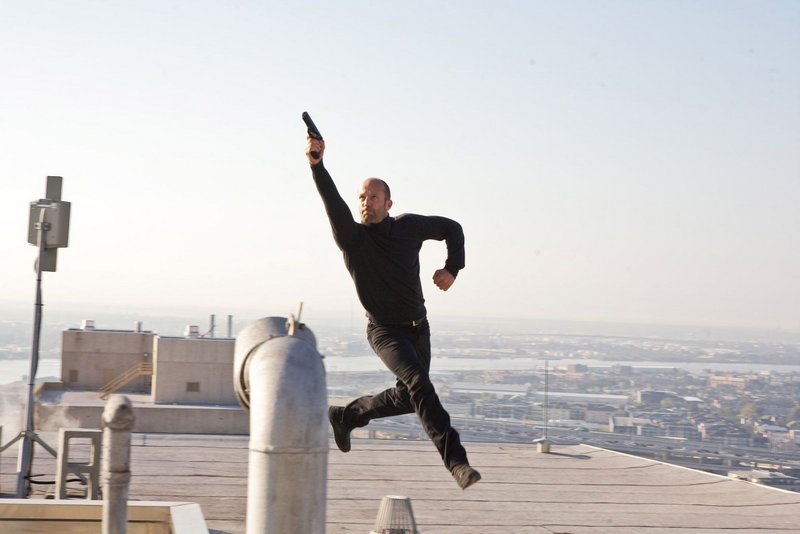NEW YORK – The first script that director Simon West got for “The Mechanic” had been written on a typewriter, and edited with scissors and Scotch tape. “It was an antique,” West said. After 17 years of trying to bring the pivotal 1972 Charles Bronson hitman epic back to the screen — and after countless rewrites that took its quasi-Shakespearean, father-son-revenge story in every possible direction — producers Irwin Winkler and Robert Chartoff had gone back to square one, i.e., Lewis John Carlino’s original screenplay.
When “The Mechanic” hits the screens Friday, it won’t be the same movie, of course: Writer Richard Wenk has updated the story by Carlino (“The Great Santini”) with contemporary villains and a more existential slant. Standing in for Bronson — and running and jumping and shooting — is action idol Jason Statham. Bronson, a box-office magnet in the ’70s, died in 2003; Statham, whose career has included the “Transporter” films, “The Expendables” and “Lock, Stock and Two Smoking Barrels,” seems a likely heir apparent to the Bronson mantle of tight-lipped, hair-trigger movie machismo.
But what does it all mean to movie audiences now? The argument for Hollywood remakes is about brand recognition: Studios pay millions of dollars to imprint a movie’s title on the public mind, and if a title arrives with audience awareness in place, then the content — and the acting, and the jokes, and even the logic — are almost secondary. But a nearly four-decade-old movie? Seventeen years ago, it made more sense. Even the marketing people agree.
“They tell us that when we screen this film,” West said by phone from Los Angeles, “99 percent of the people seeing it will have never seen the original, or even know who Bronson is. It tends to be us, the filmmakers, people interested in film history, who know all that. The people lining up don’t necessarily make the connection.”
But he thinks Statham is capable of repeating history. “I think Jason is the new Bronson,” West said, “and will go on to world domination because there are so few guys who can do this kind of thing legitimately, or are willing to do it. As soon as someone becomes big in action, they want to do romantic comedy, or some, a worthy piece of drama. So I think Jason is probably going to dominate that world. And the older he gets, the better he gets.”
Like Bronson, Statham plays Arthur Bishop, a contract killer with very particular tastes — Schubert on vinyl, a vintage Jaguar XKE in his garage — and no particular interest in whom he kills or why. Until he has to kill his only friend, Harry McKenna (Donald Sutherland). Confronted by Harry’s estranged son, Steve (Ben Foster), Arthur, prompted by guilt, takes on the younger man as an apprentice angel of death, setting the stage for a riot of action, and a denouement with classical echoes.
“Drama stays the same,” Statham said. “People don’t change, even if the technology does.”
Statham agreed that there is less in Wenk’s script about who is orchestrating the various killings and why — Tony Goldwyn plays Arthur’s mysterious employer — and greater emphasis on the characters. “It’s more about the son and his desire for revenge,” he said, “and about my guilt, and me setting this kid up in a position to exact revenge. Will he find out it’s me? Do I want him to know? Do I know that he knows? It’s pretty cool.”
So is Statham, at least regarding the Bronson legacy. “It’s always going to be compared to the original,” he said of the remake. “You can’t fill the Charles Bronson boots, so I wasn’t going to try to do something that was unachievable. The movie’s definitely been changed for today’s audiences and there’s a lot of different feel to it. At the same time, when I signed on to do the movie it was from the original, word for word.”
Send questions/comments to the editors.



Success. Please wait for the page to reload. If the page does not reload within 5 seconds, please refresh the page.
Enter your email and password to access comments.
Hi, to comment on stories you must . This profile is in addition to your subscription and website login.
Already have a commenting profile? .
Invalid username/password.
Please check your email to confirm and complete your registration.
Only subscribers are eligible to post comments. Please subscribe or login first for digital access. Here’s why.
Use the form below to reset your password. When you've submitted your account email, we will send an email with a reset code.